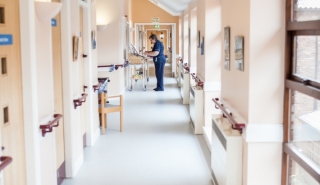In this section
Endometriosis Centre
Endometriosis is a chronic disease that affects 1 in 10 people assigned female at birth during their reproductive years. It is a condition where tissue similar to the lining of the womb grows in other places, such as the ovaries and fallopian tubes.
Endometriosis can cause many symptoms, including:
- Painful periods
- Period-type pain when not on your period
- Pain during sex
- Pain when peeing or pooing
- Pain in the back
- Bloating
- Difficulty getting pregnant
More on endometriosis from the NHS website.
Our Trust's endometriosis centre is accredited by the British Society of Gynaecology Endoscopy (BSGE). Our multi-disciplinary team of experts provides high-quality, evidence-based care and treatment for people with all grades of endometriosis.
Contact us
If you have attended the endometriosis clinic and have a follow-up appointment, contact Sue Horner, Endometriosis Nurse Specialist (CNS) on 01904 726 275. Leave a message with your name and contact details if Sue is unavailable.
You can also contact Miss Sanaullah, Consultant Gynaecologist and Endometriosis Centre Lead's secretary on 01904 721 682.
How do I get referred to the centre?
If you haven't already, speak to your GP about your symptoms. They may discuss medication options that could improve your symptoms.
Your GP or another consultant would refer you if they suspect you have endometriosis or you have already been diagnosed.
What happens at an appointment?
Our clinic runs every other Thursday afternoon with the endometriosis centre lead and an endometriosis nurse specialist.
They will discuss your symptoms and medical history before assessing the severity of your pain. Your BMI will be assessed and you may be examined by the consultant, which may include a vaginal examination.
They will discuss any further required investigations (blood tests, ultrasound scan, MRI) and potential treatment options. A plan will then be made for your treatment.
Some people may also need to attend a clinic with a colorectal surgeon or consultant urologist.
How can I prepare for my appointment?
- Keep a record of your periods (how long did you bleed for, how often are your periods, are your periods heavy?)
- Keep a record of pain symptoms and any pain relief used
- Bring a record of your current medications and any treatments your GP may have already tried with you
- Be aware that you may require an internal examination to aid diagnosis
How is endometriosis diagnosed?
You will be asked about your symptoms. It may be helpful to write down your symptoms before.
A pelvic examination will help to identify ovarian cysts, endometriotic nodules, or scarring between the bowel and vagina.
An ultrasound can identify cysts present in the ovaries and other areas of endometriosis in the pelvis.
An MRI can diagnose endometriosis and help assess the severity, including whether the bowel, bladder, and ureters are affected.
Laparoscopy (keyhole surgery) can also help diagnose endometriosis. While you are under anaesthetic, a telescope is inserted through a small cut in the navel to look inside the abdomen and pelvis.
Treatment
The treatment you receive depends on the severity of your endometriosis and symptoms.
At your clinic appointment, the consultant will discuss the most appropriate options for you and you will work together on a treatment plan.
The CNS will also offer advice on coping with pain caused by endometriosis.






